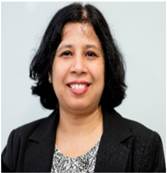IEEE PELS (Regional) Distinguished Lecturers
系列学术报告 之四
Rukmi Dutta: Breaking the barrier- high-speed and high-power Permanent Magnet Machines
报告时间:2021年11月1日 14:00-15:00
报告地点:微软Teams meeting ID:133 791 428 1
报告人:Rukmi Dutta教授
工作单位:澳大利亚新南威尔士大学
举办单位:BETVLCTOR伟德官方网站
报告人简介:

Rukmi Dutta has received the PhD degree in Electrical Engineering from the UNSW Sydney, Australia, 2007 and the Bachelor of Engineering degree also in Electrical Engineering from Assam Engineering College of Guwahati University, India, 1996. Currently, she is an Associate Professor at UNSW, Sydney, Australia. Before joining UNSW, she worked as an Electrical Engineer at CMG Pty Ltd (now Regal Beloit Australia), as a Research Associate at the Institute of Industrial Science (IIS) of Tokyo University, Japan and as an Assistant Manager at Reliance Industry Ltd, India. Her research interests are the Design and Control of Permanent Magnet Machines, Electrical Drive Systems, Renewable Energy generation and distribution. A/Prof Dutta is the associate editor of IEEE transactions on Industrial Applications Society and Energy Conversion. She is also the serving secretary of the Electric Machine Committee of the IEEE IAS.
报告简介:
The permanent magnet machines are increasingly used in many emerging applications because of high efficiency and better dynamics, which is pushing the boundary and power of such machines. The applications such as more-electric aircraft and ships, flywheel energy storage, turbo compressors in automotive applications, and numerous other direct-drive, high-speed industrial applications require simultaneously achieving both high-speed and high-power. Two performance indices rpm and tip speed – are often used to quantify the challenges of designing a rotating machine with high speed and power. Research progress and future direction to overcome the challenges for permanent magnet type machines will be the key focus of this talk.


